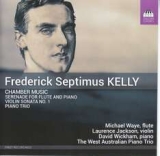Frederick Septimus Kelly, Komponist aus Australien, lebte von 1881 bis er 1916, als er im Ersten Weltkrieg fiel. 1908 wurde er mit dem Ruder Achter in London nicht nur Sieger bei der Olympiade. Von 1903 bis 1908 studierte er am Hoch’schen Konservatorium in Frankfurt Komposition bei Iwan Knorr. Als Komponist schuf er für Australien neue Standards, indem er u. a. im Kopfsatz der Violinsonate die Sonatensatzform einsetzte. Insgesamt ist diese Musik voll von leidenschaftlicher Lebendigkeit und kraftvollen lyrischen Dialogen. Man spürt die Energie des jungen Mannes als treibende Kraft, aber auch Schicksalsschläge, die er erlebt hat.
Die Serenade für Flöte, Harfe, Horn und Streichorchester erklingt hier in der Version für Flöte und Klavier, die zarter als die Streichermusik in dieser Aufnahme ist. Für die Anforderungen an die Interpreten sind Harmonie und emotionale Bandbreite entscheidend. Das Klaviertrio in zwei Sätzen ist wie die Violinsonate dicht und virtuos. Beide teilen die Anlehnung an Brahms und Mendelssohn sowie slawische Musik. Auch unvollständig ist dieses Trio hörenswert.
Laurence Jackson als Geigerin und David Wickham am Klavier zeigen die intensiven Seiten der Sonate ebenso wie sie auch die Ausdrucksstärke der Musik hervorheben. Dieses Werk bietet eine mitreißende Bereicherung außerhalb des klassischen Kanons.
Die Serenade wird ebenfalls von David Wickham an den Tasten sowie von Michael Waye als Flötist interpretiert. Entsprechend der Werkkategorie hat diese Komposition eine leichtere Kontur, die eingängig ist. Die Interpreten bürden dem Werk nicht mehr an Bedeutung auf, als ihm zukommt. Ein wenig mehr gestalterischer Wille hätte trotzdem nicht schaden können.
Das Trio wird vom West Australian Piano Trio, also auch lokalen Interpreten, dargeboten. Margaret Blades, Violine, Michael Goldschlager, Cello sowie wiederum David Wickham am Klavier zeigen eine so ansprechende Interpretation, dass man hoffen mag, die fehlenden Sätze des Werkes finden sich in Zukunft noch mal auf irgendeinem Dachboden, falls sie überhaupt komponiert wurden.
So erlaubt diese Sammlung, jedenfalls aus europäischer Sicht, einen spannenden Blick auf die Rückseite der Erde.
Frederick Septimus Kelly, composer from Australia, lived from 1881 until 1916, when he was killed in the First World War. In 1908 he was not only the winner of the Olympics with the rowing eight in London. From 1903 to 1908 he studied composition with Iwan Knorr at the Hoch’schen Konservatorium in Frankfurt. As a composer, he created new standards for Australia by, among other things, using sonata form in the opening movement of the Violin Sonata. Overall, this music is full of passionate vivacity and powerful lyrical dialogues. One senses the young man’s energy as a driving force, but also the strokes of fate he experienced.
The Serenade for flute, harp, horn and string orchestra is heard here in the version for flute and piano, which is more tender than the string music in this recording. Harmony and emotional range are crucial to the demands on the performers. Like the violin sonata, the piano trio in two movements is dense and virtuosic. Both share leanings toward Brahms and Mendelssohn as well as Slavic music. Even incomplete, this trio is worth hearing.
Laurence Jackson as violinist and David Wickham at the piano show the intense sides of the sonata as well as highlighting the expressiveness of the music. This work offers a stirring enrichment outside the classical canon.
The Serenade is also performed by David Wickham on keys as well as Michael Waye as flutist. In keeping with the category of works, this composition has a lighter contour that is catchy. The performers do not burden the work with more importance than it deserves. Still, a little more creative will could not have hurt.
The trio is performed by the West Australian Piano Trio, also local performers. Margaret Blades, violin, Michael Goldschlager, cello and again David Wickham on piano show such an appealing interpretation that one might hope that the missing movements of the work will be found in some attic in the future, if they were composed at all.
So this collection allows, at least from a European point of view, an exciting look at the backside of the earth.
























